A non-governmental group called HerLeap Network has stated that women should be given more power to increase their involvement in the next election cycle in Nigeria.
This was announced at the SheRise conference held on Thursday at the US Consulate in Lagos with the theme 'Women in Politics: the Risk and the Leap.'
According to the Carnegie Endowment For International Peace, after the 2023 general elections, the number of women in the National Assembly dropped by 19 percent compared to the previous Assembly, with women now holding three percent of seats in the Senate and four percent in the House of Representatives.
In all national and subnational categories, women made up just over 10 percent of over 15,000 candidates who ran in the 2023 elections for president, the National Assembly, governorships, and state assemblies. Ninety percent of the women ran on less well-known platforms.
Speaking at the conference, the Global Coordinator of the HerLeap Network, Adetoun Tola, said the conference was not just about talking but also about taking action to prepare women for the next election cycle.
She said, “We need more capable women in the next election cycle, and they might just be the ones that the opposition won’t anticipate. Our gathering here is to boost our determination as women in the field of politics. We have witnessed women accomplishing extraordinary things in the political arena, and we have observed women simply showing support for women empowerment. This is about making the most of our advantages and providing practical and impactful solutions. We need to do this for our children and future generations.”
“We are not competing against men,” Tola emphasized. “We need to be complete and do the work.”
Speaking with The PUNCH, the US Consul General, Will Stevens, said, “It is an honor to host this conference at the consulate today, focusing on the role that women can play in Nigerian politics and how we can promote and increase women's participation in politics. We have some incredible mentors here today. The mentorship that women can provide to support each other is very important.
“As the pioneers move forward, they should be bringing more and more leaders along with them in order to increase political participation. This is the foundation of many programs that the US mission here supports.”
During his welcome address, the CG described Nigerian women as an incredible group of individuals, more of whom are needed in the politics of the nation. However, he urged women to attract the attention of the people.
He said, “Speak up and support each other. We live in a society where attention spans are short and it is really difficult to break through to get attention. As a female leader, you need to have attention. Go for it, demand it, and ensure that you have a seat at the table. For me, this means women need to be where decisions are made. When you are in the room where decisions are made, better choices are made.”
Also speaking at the conference, the former Nigerian ambassador to Jamaica, Maureen Tamuno, urged women to not only settle for the position of woman leader but also seek out other positions at the local level and above.
Giving advice on how to increase female involvement in politics, Tamuno, the first female Local Government chairman in Rivers State, mentioned that many women avoid politics because of fear of criticism, but they need to be courageous and face it. She emphasized the importance of understanding the needs of the people and the significance of making a noticeable impact while also being modest in appearance.
Katrina Kamara, a US Fulbright Scholar, emphasized in her presentation that women play a vital role in strengthening democracy, stating that when women actively take part in the democratic process, their influence becomes evident and helps prevent a decline in democracy.
Professor Abiola Sanni, SAN, a professor of commercial law at the University of Lagos, talked about the legal aspect, explaining that women should imagine the reforms they want to see in Nigerian politics, as the current structure may limit them even if they attain a political position.
He highlighted the importance of women envisioning the necessary changes, cautioning that entering office under the current system may not lead to significant improvements. He urged women to approach matters differently and make a substantial impact similar to Awolowo and Jakande.
Professor Sanni also called for the establishment of a legal framework to support the existing gender policies in Nigeria.



